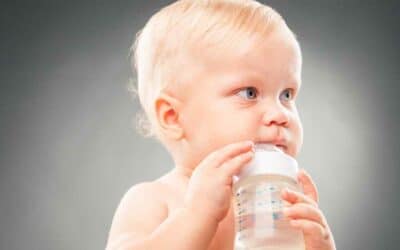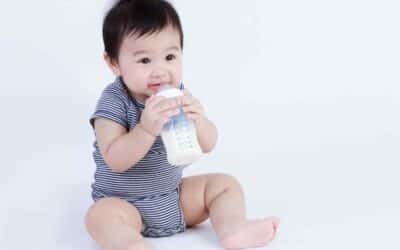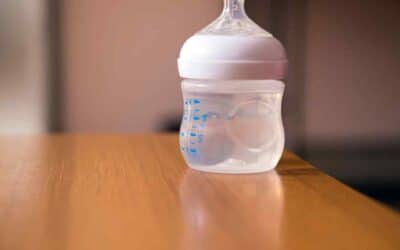Water is the lifeblood of our planet; it nourishes, restores, and sustains every living organism, from the tallest tree to the smallest microorganism. Among all the myriad life forms that rely on water, none is more precious than our babies. The health and well-being of our infants hinge on the quality and safety of the water they consume. Babies’ delicate systems need pure, clean water not only to stay hydrated but also to aid in digestion, development, and overall health. The importance of safe drinking water safety for babies cannot be overstated.
This article delves into the importance of having access to safe drinking water for babies when you mix formula, highlighting its role in infant nutrition and the potential health risks of unsafe water. As we explore the guidelines for ensuring the purity of your baby’s water, we also touch upon the critical role of governments and public health organizations in maintaining and enhancing water safety standards. With an understanding of these facets, we hope to empower parents and caregivers, enabling them to safeguard their little ones’ health and support their growth and development effectively.

The Role of Water in Infant Nutrition
Water plays an integral role in infant nutrition, starting from birth. It is a crucial component of breast milk and baby formula, which provide all the hydration and nutrients a baby needs in the first few months of life. Besides nutrition, water helps regulate a baby’s body temperature, aids in digestion, and contributes to the overall health of a baby.
Breast milk is often referred to as the ‘gold standard’ for infant nutrition. It is naturally balanced to meet the nutritional needs of an infant and contains over 80% water. However, not all mothers can or choose to breastfeed, and baby formula serves as a nutritious alternative. Herein lies one of the first encounters with drinking water for a baby. The safety of the tap water used to mix formula becomes paramount, given the potential presence of environmental contaminants.
The American Academy of Pediatrics (AAP) emphasizes the importance of clean, safe water for formula preparation, considering infants’ delicate systems are particularly susceptible to environmental contaminants, including lead, bacteria, and endocrine-disrupting chemicals. Any contamination can adversely impact pediatric environmental health.
Choosing Between Purified vs. Distilled Water
Choosing the best water for baby formula often brings up the question: purified vs distilled water? While both purified and distilled water undergo processes to remove contaminants, they are not exactly the same. Purification removes chemicals and pathogens, while distillation involves boiling the water and collecting the steam, which eliminates a broader range of contaminants. You can use both types for baby formula. However, if the tap water in your area has severe contamination, distilled water might be a safer choice.
Can babies drink purified water? Can they have distilled water? According to AAP guidelines, babies should ideally not drink water by themselves until they start eating table food, usually around six months of age [1]. But when they do begin to need more than what breast milk or formula provides, the water they drink must be safe. Both purified and distilled water, including specific ‘baby water’ products, can be suitable for baby consumption as they meet the maximum contaminant levels set for drinking water.
The question of fluoride often comes up in discussions about baby water. Fluoride in moderate amounts helps prevent tooth decay, but excessive intake can cause dental issues. Some parents prefer using fluoride-free water for their infants. However, the AAP maintains that fluoride in water is safe for babies and can help protect their teeth as they grow.
When making choices about water for your baby, it’s essential to consult with a healthcare professional who understands your local environmental health conditions and can provide guidance suitable to your baby’s needs. Whether it’s tap water, purified, or distilled, ensuring it is free of contaminants is key to supporting your baby’s health and growth.

Understanding the Specific Needs of Babies
Infants have unique hydration needs, different from adults or even older children. In their initial months, babies receive all the hydration they need from breast milk or formula. The American Academy of Pediatrics (AAP) recommends not giving babies additional drinking water until they begin eating solid foods, typically around six months of age. This is partly because their kidneys are still developing and can’t handle large amounts of water.
When water does become part of their diet, ensuring it is clean and safe becomes crucial. Tap water can sometimes contain contaminants that may pose health risks for babies. It’s essential to understand your local water quality and take necessary precautions, such as using a certified water filter or boiling water before use.
Making Baby Formula: What Water to Use?
When it comes to making baby formula, the type of water you use is important. You can use different kinds of water – tap, distilled, or purified – but they must be free from harmful contaminants.
Distilled versus purified water is a common question among parents. While both types are processed to remove contaminants, the methods used are different. Purified water is filtered to remove chemicals and pathogens, while distilled water goes through a boiling and condensation process, removing a broader range of potential contaminants.
If your tap water is heavily contaminated or hard, using distilled or purified water for making baby formula might be a safer choice. It’s always best to consult your baby’s pediatrician or a local health department if you’re unsure about your tap water’s safety.
Fluoride in Baby’s Water: Is it Safe?
Fluoride, often present in tap water, has benefits and potential drawbacks. It helps prevent tooth decay, which is why many dentists recommend fluoridated water. However, too much fluoride can cause dental fluorosis, a condition that affects the appearance of tooth enamel.
Some parents prefer to use fluoride-free water for their babies, particularly when mixing formula, to avoid the risk of fluorosis. It’s crucial to note that the AAP supports the use of fluoridated water for children but recommends parents speak with their pediatrician or dentist to decide what’s best for their child.

The Distinction Between Distilled and Purified Water
Distilled and purified water are not the same, even though both are processed to remove impurities. The main difference lies in the purification process. Distillation involves boiling water and collecting the steam, which effectively removes a wider range of contaminants.
Conversely, purification removes chemicals and certain pathogens through methods like reverse osmosis, deionization, or carbon filtering. Both types of water can be used for babies, but if you live in an area with heavily contaminated tap water, distilled water might be the safer choice.
In the end, understanding the specific needs of babies in terms of water consumption and safety is vital for their growth and development. Consultation with a healthcare professional who understands your local water conditions can greatly aid in making the right choices for your baby’s health.
The Role of Water in Infant Nutrition
Water serves as the primary mixing medium, allowing the formula to reach the right consistency for a baby’s consumption. However, the safety of the drinking water used in the formula is crucial as contaminated water could introduce harmful environmental contaminants. Water contaminants could negatively impact a baby’s health outcomes, posing an increased risk of illness and developmental issues.
The use of safe water for formula preparation cannot be stressed enough. If you use tap water from a private well or public water supply, it is essential to understand your water quality. The Centers for Disease Control and Prevention (CDC) provides guidelines for testing and treating private wells to remove potential coliform bacteria and other contaminants. Boiling tap water before mixing formula is also a safe practice to eliminate harmful pathogens.
Role of Water in Transitioning to Solid Foods
When babies start transitioning to solid foods, usually around six months, water begins to play an even more significant role. Healthy hydration is key during this period, not only to support digestion but also to prevent dehydration. Introducing plain water, alongside other fluids, is essential during meals and throughout the day.
For some babies, drinking water from a fancy cup can be an exciting new experience that encourages water intake. However, it’s important to avoid giving babies cold water or ice cubes directly. Very cold water can be a shock to a baby’s system, and ice cubes present a choking hazard. Instead, use lukewarm or room-temperature water for the best results.

Hydration Benefits for Infants
Water provides numerous health benefits for infants, including maintaining body temperature, aiding digestion, and facilitating nutrient absorption. As babies grow into young children, staying adequately hydrated becomes crucial for cognitive function and behavior management. Some scientific evidence suggests that poor hydration can lead to attention and behavior problems in older children.
However, parents and caregivers must be cautious not to overhydrate babies. They need smaller amounts of water compared to older children and adults. Too much water can lead to a rare but serious condition called water intoxication, where essential electrolyte levels in a baby’s body become dangerously low.
As climate change continues to impact water safety, ensuring a consistent supply of clean drinking water is vital. This may mean using filtered or bottled water if necessary. And while flavored water or sports drinks might seem like a fun way to increase a child’s water intake, these are not recommended for babies or young children due to their high sugar content. For a fun, hydrating treat, try filling popsicle molds with water and small pieces of fruit or using foods with high water content, like iceberg lettuce.
Potential Health Risks of Unsafe Drinking Water
Safe drinking water for babies, while essential to life and healthy hydration, can pose health risks if it contains harmful contaminants. Babies, due to their smaller size and developing systems, are especially vulnerable to these risks. Therefore, it’s crucial for caregivers to be vigilant about the safety of the water source used for their babies.
Contaminants in Unsafe Water
Unsafe drinking water can carry a range of contaminants. Some of these occur naturally in the environment, while others result from human activities. Potential pollutants include lead, coliform bacteria (including E. coli), nitrates, pesticides, and other chemicals.
Lead, for example, can leach into drinking water from old pipes in public water systems or private wells. Coliform bacteria, on the other hand, indicate the presence of fecal matter, which can introduce other harmful pathogens. Nitrates, commonly from agricultural runoff, can also contaminate well water.
Recent research also shows that some water systems might contain small amounts of pharmaceuticals or endocrine-disrupting chemicals, although the risk these pose to human health is still being studied.

Specific Health Risks Posed to Babies
The health risks posed to babies from contaminated water are significant. Lead, even in tiny amounts, can have severe impacts on a child’s brain development, leading to cognitive and behavioral problems. High levels of nitrates are dangerous for babies, causing a condition called ‘blue baby syndrome’ where the blood can’t carry enough oxygen.
Bacterial contamination can lead to gastrointestinal illnesses, which in a baby can quickly lead to dangerous levels of dehydration. Water intoxication, a rare but serious condition, can occur if a baby drinks too much water, diluting essential electrolytes in their body.
Given these risks, it’s crucial to ensure babies drink safe water. New parents often ask, “How much water should my baby drink?” The answer varies with age. Babies under six months typically don’t need additional water outside of breastmilk or formula. As babies start solids, they can begin to have small amounts of plain water throughout the day, gradually increasing as they grow into older children.
Remember, while it’s essential to stay hydrated, it’s equally important not to overdo it. Juices or flavored water can be introduced as the child grows older but in limited quantities due to sugar content.
Conclusion
In conclusion, the importance of safe drinking water for babies cannot be overstated. From playing a vital role in the preparation of baby formula to ensuring healthy hydration as babies transition to solid foods, water is essential at all stages of a baby’s early development. However, it’s the safety of this water that matters significantly. With potential contaminants that can pose severe health risks, it becomes a priority for parents and caregivers to ensure the water used is devoid of harmful substances.
As our babies grow, the introduction of safe drinking water for babies should be gradual and monitored. While staying hydrated is essential, overhydration can lead to water intoxication, a serious condition in babies. As always, it’s advisable to consult with healthcare professionals to understand better your baby’s unique needs.
Through our conscientious efforts to ensure safe drinking water, we can significantly contribute to our babies’ healthy growth and development, setting the stage for their well-being in years to come.
Did this article help you? If so, please feel free to ask any questions in the comments section.



